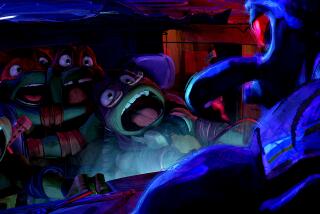Keeping Its Cool
- Share via
Waiting in line at the post office the other day, I had time to peruse a giant poster advertising a new stamp featuring the dewy visage of James Dean. He’d be 70 if he were still alive, but on his stamp, he’s as beguiling as always. You can be hip forever if you never grow old, which is why Dean and Jim Morrison and Kurt Cobain are as cool today as the day they died. If you outlive your first burst of success, your cool fades like a vacation tan.
In today’s supercharged media culture, hipness is more fleeting than ever. One of the rare exceptions to the rule is MTV, and most of the credit goes to its 55-year-old geezer guru Tom Freston, the longtime chairman of MTV Networks, who has managed to keep a corporate behemoth light on its feet. Staying cool is hard-wired into the DNA of MTV, which is now a global beacon of American youth culture, shown in 342 million households in 140 countries around the world. The Viacom-owned network (which includes MTV Films as part of its operation) recently celebrated its 20th anniversary, an occasion marked by a flurry of media coverage of MTV’s role in influencing pop iconography--Freston even found himself on “Hardball,” being interrogated rat-a-tat style by Chris Matthews about MTV’s obsession with bare-midriff teen sexuality.
MTV deserves the attention. Love it or hate it--and can I just say right here that “Say What? Karaoke” could be the hokiest show on TV--over the past 20 years, from Madonna to Eminem, MTV has become the ultimate arbiter of teen cool.
MTV had its worst ratings slump in the mid-’90s, when it was slow to drop grunge rock in favor of the teen pop phenomenon. Freston learned his lesson. In youth culture, a new generation arrives roughly every four years. “The tendency in the entertainment business is to take a good thing and milk it dry,” Freston says. “But when you’re successful is when you should start looking for something new. It would be terrible if people said, ‘Geez, MTV is still flogging that ‘Unplugged’ show. We could change everything at MTV every three or four years, and it would all be for the good.”
If you’re growing up in America, nothing else is remotely as influential as MTV in shaping your taste in music, movies and fashion, the three subjects that absorb roughly 99% of the average teenager’s day-to-day brain transmissions. The network’s secret of success? It constantly reinvents itself. As MTV Group President Judy McGrath put it recently: “One of our key decisions was to be the forever-young channel, not to stick with Rod Stewart, but constantly embrace whatever was coming down the pike.” (When you get old, you simply migrate to VH1 and then TV Land, while your kids watch Nickelodeon, all part of the cradle-to-the-grave umbrella that generated more than $3 billion in revenues for MTV Networks last year.)
“It’s hard to be big and be cool too, but when it comes to institutions, MTV is about as corporately cool as you can get,” says ex-Virgin Records chief Jeff Ayeroff, who masterminded last year’s “Beatles 1” marketing blitzkrieg. “If MTV was just about the bottom line, it would’ve failed. Tom’s brilliance is that whenever things feel complacent, he shakes it up. He knows that if they keep their cool, the money will follow.”
MTV has a knack for catching a wave and abandoning it before it hits the beach. When the appeal of all-videos-all-the-time began to wane in the late 1980s, the network began creating its own new programming. When Hollywood began courting young moviegoers each summer, MTV made itself an indispensable launching pad to promote its films.
It also embraced the disposable nature of our fickle culture long before today’s one-hit pop wonders took over the pop charts. Forget about Joe DiMaggio--where have you gone Martha Quinn, Julie Brown, Pauly Shore, Jenny McCarthy and Jesse Camp? MTV is the first network with an attention span as short as its viewers’. “For us, a long-term contract for our personalities is one year,” says Freston, who seemed unruffled by the news that “Jackass” star Johnny Knoxville might jump ship after only one season on the high-rated stunt-filled reality show.
“People start with us and then move on. It just gets faster. Mike Judge did ‘Beavis and Butt-head’ for three or four years. Johnny was on for three weeks, and he was already getting movie offers.”
MTV rarely bothers to lock up its talent because it knows each new generation wants its own heroes. “Total Request Live” host Carson Daly will soon be moonlighting as host of NBC’s late-night show “Later.” Can “Hollywood Squares” be far behind?
The ace MTV has up its sleeve is this: It has a stranglehold on its core audience. If you want to see music videos, you basically have to go to MTV. As Artemis Records chief Danny Goldberg puts it: “One year it’s Nirvana, next it’s Puffy Combs or Korn or Staind, but if you want to see them, where else are you going to go? The music still frames MTV’s identity, which gives them a core audience that’s by definition young and hip.”
MTV is not afraid to flex its muscles. For years it shut out potential video network rivals by arranging exclusives on major new videos. This summer the network did promotional specials for 20 youth-oriented movies, but studio marketers complain that its willingness to air the specials is closely tied to studios’ willingness to buy healthy chunks of advertising on the network. And as The Times reported Friday, artists appearing on MTV’s annual “Video Music Awards,” airing Sept. 6, have to agree not to perform on a wide range of entertainment TV outlets for 30 days preceding the awards, prompting claims by competitors of unfair booking rules.
MTV is more nimble--and thus more hip--than its corporate rivals because it operates from the bottom up, not the top down. Its programming is cheaply produced, so it’s more willing to take a risk on an oddball idea than a movie studio that spends $100 million to make and market a film. Ted Demme, now a successful film director, came up with the idea for “Yo! MTV Raps” when he was an intern at the network. Tom Green was discovered doing a local-access TV show--in Canada. One of its shows in development for next year is a real-life sitcom starring Ozzy Osbourne and his family.
“We don’t have a Kremlin-like control command where decisions are made at the top,” Freston says. “At my age, I certainly don’t come in with any great ideas. We have a great young staff who are encouraged to take creative risks. You can’t have a lot of second-guessers--that’s why ‘The Sopranos’ is on HBO and not on ABC.”
Like the major studios, MTV uses reams of research to stay in touch with its audience. But studios essentially use research to satisfy their audience’s lowest-common-denominator reaction to a film. MTV uses research to discover what new pop culture trends are being embraced by its audience’s most progressive fringe--the kids known as early adopters.
“What the studios do, and it amazes me, is they make a movie, test it and then they adapt the film to the research, by changing the ending or cutting out an unpopular scene,” says Freston. “You can imagine how that makes the creator of the film feel, who’s saying, ‘So you want to make all these changes because some guy you found on the mall who might be on acid didn’t like my movie?’ We do research to help our creative people make connections with the leading edge of the culture. The idea is to talk to an extreme skateboarder or a Japanese reggae freak and see if we can catch a change in the wind.”
MTV has plenty of stiff challenges ahead. Its critics say it has overdosed on teen fluff and soap opera programming, making it increasingly difficult for Freston to propagate the advertiser-friendly myth that the network’s core audience is 17-to 25-year-olds--judging from the kids in my neighborhood, 15 seems more like it. And if the advertising climate remains sluggish, it will be hard to satisfy Viacom’s insistence on achieving a cash-flow growth of 20% a year, as MTV has for the past 14 years.
If anyone can keep MTV on the cutting edge, it will be Freston. When most of today’s show-biz tycoons were in their 20s, they were busy climbing the corporate ladder. When Freston was that age, he wandered the globe, emulating his Beat hero Jack Kerouac, ending up spending eight years running a textile company in India. His travels gave the onetime vagabond a restless thirst for exploring new horizons.
“I like having people at MTV who are passionate about pop culture and who like to devour new things, whether it’s seeing movies or traveling around the world,” he says. “I’m very paranoid of us not being different enough. When people become adults they often become resistant to change. So I’m always looking for people who don’t just like new ideas, but who live on them.”
“The Big Picture” runs every Tuesday in Calendar. If you have questions, ideas or criticism, e-mail them to patrick.goldstein@latimes.com.
More to Read
The biggest entertainment stories
Get our big stories about Hollywood, film, television, music, arts, culture and more right in your inbox as soon as they publish.
You may occasionally receive promotional content from the Los Angeles Times.










